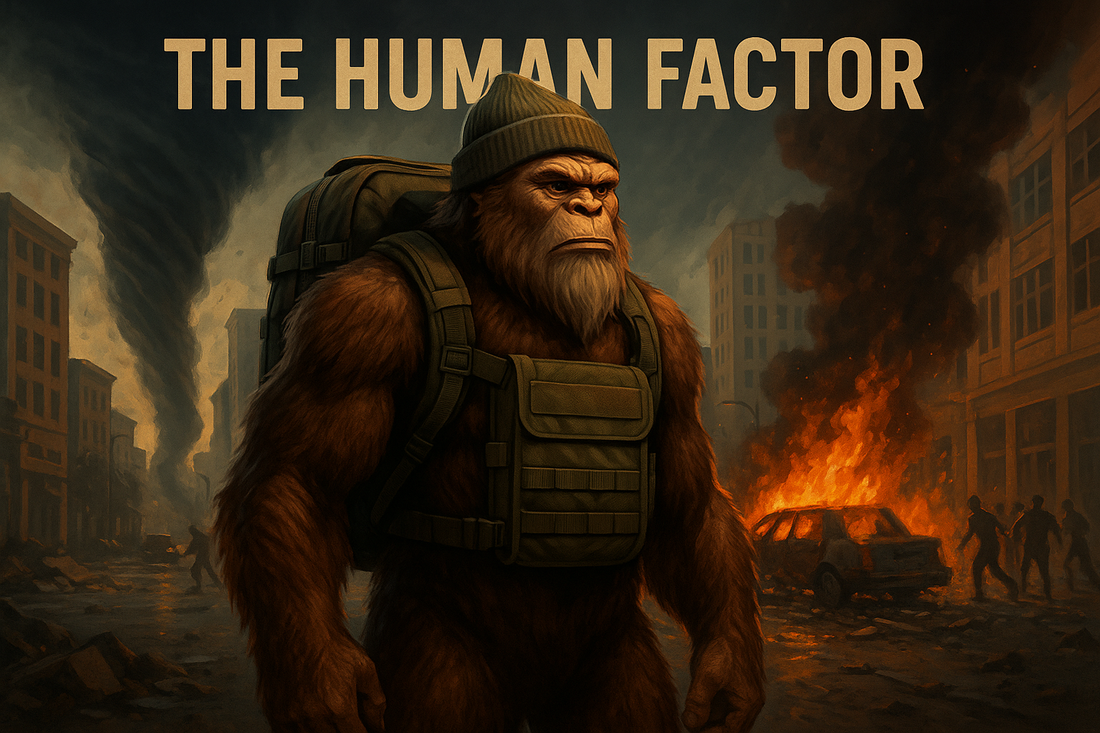The Human Factor: Facing the Dark Side of Emergencies
Preparedness isn’t just about food, water, or gear — one of the biggest risks in any disaster isn’t the storm or the blackout. It’s people.
Behavior Under Pressure: The Harsh Reality
When systems fail, human behavior often fractures. Stress, fear, and desperation can push people to extremes.
New Orleans after Hurricane Katrina in 2005 is one of the clearest examples. The levee failures flooded most of the city, cutting off supplies and leaving thousands stranded. With the government response collapsing, lawlessness spread across the city.
At the time, I was in Iraq working in the Operations Center. We saw the satellite images of the hurricane’s destruction and the tidal surge in time-lapse photos. For the next month, our Operations Center was flooded with updates on the recovery effort. The 82nd Airborne — part of our command under 18th Airborne Corps — was redeployed to New Orleans. Part of the division was still forward in the Global War on Terror, while another part was suddenly dropped into the chaos of a collapsed American city.
We briefed our general daily on their movements and read their sit-reps. Those reports confirmed what many back home only saw in fragments on the news: looting, roving crime, and civil breakdown so severe that combat-trained paratroopers had to restore order in the streets of an American city. It was sobering to see in real time how fast a modern, urban center could unravel when systems failed.
-
Looting became rampant. Businesses were stripped bare, from grocery stores to electronics shops. Many took essentials, but plenty took advantage, grabbing luxury goods while police were outnumbered and overwhelmed.
-
Roving crime and violence surged. Armed gangs moved through neighborhoods, reports of carjackings and assaults spread, and many families were left to defend themselves.
-
Chaos at the Superdome and Convention Center. Tens of thousands of evacuees were crammed into shelters with little food, water, or security. Fear, desperation, and lack of order turned them into places of misery and danger.
-
Military intervention was required. It ultimately took the 82nd Airborne Division and National Guard units to restore order in the streets.
While some academics later tried to downplay the violence, anyone who lived through it knows the truth: when government fails and order collapses, predators and opportunists step into the gap.
What We See in Emergencies
People tend to split into groups:
-
Sheeple – The lost, confused, and unprepared, swept along with the crowd.
-
Opportunists – Those who exploit chaos for quick gain.
-
Predators – The violent and criminal who prey on others.
-
The Prepared – The few who anticipated this and had the means to stay safe, mobile, and supplied.
Preparedness for Human Chaos
Survival gear isn’t just about braving the elements — it’s about surviving the human side of disaster:
-
Redundant supplies mean you don’t have to risk crowds or looted stores.
-
Mobility and stealth keep you ahead of unrest.
-
Durable, reliable gear ensures you don’t become a victim of bad equipment when it matters most.
Where Squatch Survival Gear Fits In
- Mothman Backpack — A compact tactical backpack for air travel and urban survival. Rugged, Berry-compliant, and perfect for staying mobile under load.
- Rougarou Pack — An American-made survival backpack built for bug-outs that last days. Modular expansion and comfort keep you moving even when carrying heavy essentials.
- Night Howler — Durable EDC gear for urban survival. Lightweight, low-profile, and built to blend in when panic spreads.
- The Gnome Chest Pack — For bare-minimum essentials in emergencies. Worn on the chest with an ergonomic X-harness or as a sling, it keeps critical items instantly accessible:
-
-
ID and documents (so you can move through checkpoints)
-
Cash in small denominations
-
Multitool or knife for quick fixes and defense
-
Flashlight for blackouts or darkened buildings
-
Tourniquet or medical essentials for life-threatening injuries
-
Comms gear (small radio or phone) for staying connected when systems fail
-
When storms pass but order fails, your edge is preparedness with purpose. Squatch Survival Gear is made in America, by hand, for survivalists, preppers, and first responders who know the human factor can be as dangerous as the disaster itself.
When storms pass but order fails, your edge is preparedness with purpose. Squatch Survival Gear is built in America for the moments when the human factor becomes the greatest danger.

